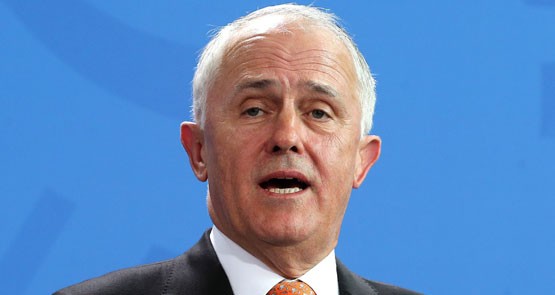
Prime Minister Turnbull understands that Australia isn’t merely an interested and sympathetic bystander to what happened in Paris, but has a direct stake in the global response and lessons to learn from the slaughter and its aftermath. True — and contrary to the left-wing scolds who complain we don’t grieve for non-Westerners in exactly equal amounts — there are over 100,000 Australians born in France or with French parents; 400,000 of us visit France every year; nearly 300,000 Australians — fully 6% of the population — served in France in World War I. Australians rightly feel the deep anguish of the French at a time of mourning. But we have a direct policy interest in this beyond feelings of kinship.
Like France, Australia is involved militarily in both Syria and Iraq against Islamic State, courtesy of Tony Abbott’s decision — on dubious legal grounds — to extend bombing to Syria. Our role is small, almost trifling, but it makes us even more of a target for IS and its Western sympathisers. With its murder of 224 Russians on board flight 9268 and the murder of 43 people in a bombing in Beirut, plainly IS is eager to lash out at its military opponents on a battleground where the odds are more even, and while Australia is more distant and has none of the problems Europe faces in relation to a steady tide of Syrian refugees, killing Australians is undoubtedly on their minds.
Turnbull’s response to event in Paris was designed around providing reassurance that Australians were as safe as possible and that this was an atrocity abhorred every bit as deeply by Muslims as by non-Muslims. There’s a banally parochial reflex, including in the media, to try to lever a foreign incident into a domestic context and demand some sort of action here, however distant from the actual events — much of Turnbull’s interview on Insiders was given over to questions about raising the threat level in Australia and whether we somehow needed “a more rapid response”, whatever that meant. Without the absurd hype and childish rhetoric of his predecessor (although claiming “we have the finest security agencies in the world” is a bit rich in the wake of the bungling of the Man Haron Monis case), Turnbull was at pains to provide reassurance — almost literally: “The security agencies do not believe that there is any evidence at the moment to justify any increase in that alert level. So we should be reassured by that.”
He also offered a carefully crafted take on the inevitable efforts of bigots to exploit the dead. Turnbull had been in Indonesia — the world’s largest Muslim country, and one of our closest neighbours — only a couple of days before. In a way that reframed Islam outside of the terrorist framework into which the media and Islamophobes constantly want to place it, he quoted President Joko Widodo:
“They want to be able to establish a religious tyranny, one that, as the President of Indonesia was saying to me only a few days ago, one that is at odds, completely contrary, to the precepts of Islam that his countrymen and women practice. As President Widodo said, these terrorists commit a double crime. They are murderers. They are mass murderers. They are barbarians but at the same time, they also defame religion. They defame, they blaspheme, they defame Islam. And the President of Turkey, President Erdogan, another large Muslim country, made exactly the same points to me today.”
Erdogan, of course, was long a supporter of IS and allowed thousands of foreign fighters to join them via his border with Syria, so his points should be considered with some scepticism. But Turnbull’s response was as far as possible from Tony Abbott’s disgusting, utterly wrong attack on Muslim leaders in the wake of the Sydney Lindt cafe siege for failing to condemn violence enough.
And whereas his predecessor was obsessed with expanding Australia’s military intervention in the region — even contemplating a unilateral invasion with ground troops — Turnbull, despite journalists pressing him to talk about military options, was far more circumspect.
“The, most effective boots on the ground are going to be Syrian boots on the ground … There appears, there are some good signs coming out of Vienna, and a settlement, some form of transition to a new government, there may well be a role for peacekeepers. But I’d have to say that I think the most — it would be very important that any external peacekeeping forces were, wherever possible, provided by countries within this region, because that is, they are likely to receive greater acceptance from the people in Syria. So that’s an important practical political point. I mean, our commitment is absolute to supporting a settlement, a resolution of the challenges in Syria, but we have to make sure that everything we do and everything we support is calculated to achieve that.
It turns out that an Australian leader can respond to terrorist incidents without exploiting them for partisan advantage, demonising Muslims or using childish rhetoric dreamed up in the darker recesses of the PMO to make themselves look good.








I don’t think it’s entirely unreasonable to question the huge difference between the media’s coverage of the French attacks and of those in Lebanon. If connectedness is the measure, surely there’s a comparable number of Australians of Lebanese heritage?
When it’s us or our allies it’s strategic bombing..when its them its terrorism..some form of dialogue is the only solution..the constant repeating of failed strategies is a form of lunacy..
We have Tony Abbott to ‘thank’ for inviting Australia to join in the bloodbath in Syria.
Will this be one policy area where Turnbull is permitted by right wing LNP colleagues to steer our course?
A somewhat more adult response.
John, it long ago became obvious it was asking far too much of the Crikey Coven to expect adult responses from them.